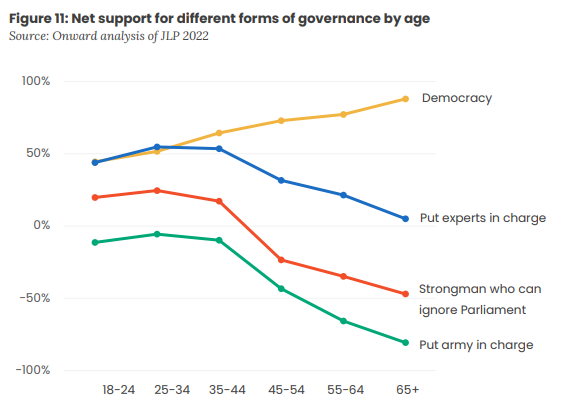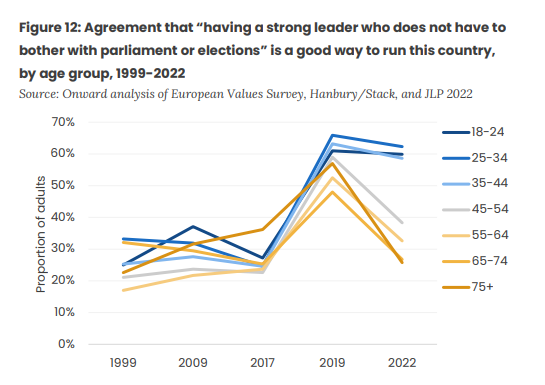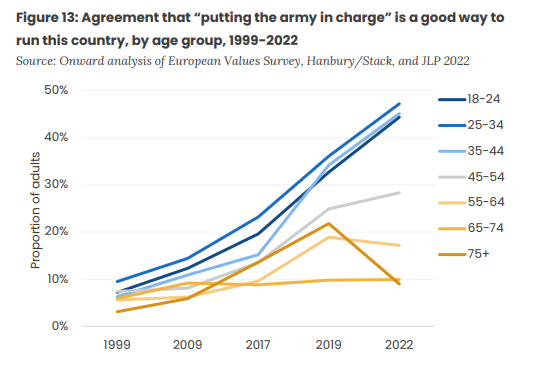Traditionally, we might have expected the UK’s young people to be more liberal or left-wing than their older counterparts on most topics - see for example which party various age groups voted for in the 2019 general election according to Yougov’s poll. But from a recent report it seems like younger folk are not huge fans of a rather fundamental aspect of liberal democracies - the democracy part.
A poll conducted by J.L. Partners on May 2022 for a report published by Onward, a conservative thinktank, on a sample of UK respondents weighted to be nationally representative on several demographic factors found that young people are not great fans of democracy.
Starting off with a chart shown on page 20 of the report:

We see the younger age brackets having fairly low net support when asked whether a democracy was a a “very good”, “fairly good”, “fairly bad”, or “very bad” way of running the country. Around a quarter of 18-34 year olds felt that democracy is a bad way of governing the country (the equivalent figure for over-55s is 8%).
A similar net proportion of the young thought some kind of technocracy was a good way to run a country as felt the same about democracies.
Admittedly life in the UK doesn’t exactly feel well-governed to many of us at present, to put it politely - so perhaps that’s fairly understandable. A different survey, carried out by IPPR found that only 19% of UK’s 18-24 year olds felt democracy has served them well, vs 55% who say badly. What surprised me a bit more was the support for some of the rather more authoritarian options.
There was a net 23% support for “a strongman who can ignore parliament” as a good way to run the country in 18-34 year olds, vs a negative -42% in > 55 year olds. 60% of the youngest group, 18-24 year olds thought it was a good idea.
Even the rather radical “put the army in charge” only just got a negative support rating in younger cohorts - net disapproval of 8% in 18-34 year olds vs -74% in >55 year olds. 44% of the 18-24 year olds were favourable towards this type of rule.
So is this a young person thing? Maybe despite being liberal in many other domains young folk always think strongman or army rule is a decent option? As well as not really making intuitive sense, it also isn’t the case.

To be honest, I find the even the agreement level in the “good years” surprisingly high - and just look at the 2019 results! - but clearly something changed such that the younger folks still think relying on a single strong leader is a good way forward.
Likewise a pro army rule position has just gotten more and more popular over time, especially in younger cohorts.

Based on this admittedly fairly small time series, it doesn’t look to be a general age effect.
Some of the factors the report suggests are linked to this support for authoritarian rule include:
- Socio-economic circumstances, with the least secure 20% of voters being more than twice as likely as the most secure to say that democracy is a bad way to govern the country.
- Social connection, with people with more friends, or more diverse friend circles, being less likely to support authoritarian rule.
- Political leanings, with socially conservative young people being much more likely than liberal folk to support the strong man or army rule.
A lot of that makes intuitive sense at least on the dislike of democracy side of things. If you live in a democracy and you have a particularly difficult life, why would you feel like it’s a good way to run things?
Thinking one form of rule is a good way to govern a country of course doesn’t rule out also thinking others are. For example, young people who report generally trusting other people are both more likely to support democracy than those who don’t, (81% vs 69%) but also more like to support strongman leaders (72% vs 51%). In fact a higher proportion of young people who say democracy is a good way to run the country also support the authoritarian methods of rule than those who don’t. Perhaps some people just think that there isn’t a good way to run a country?
The report authors believe that the drivers of general detachment that are leading to this and many other negative effects on young people can be summarised as being the narrowness of their social networks, overprotective parenting, the treadmill of modern work and the online culture.